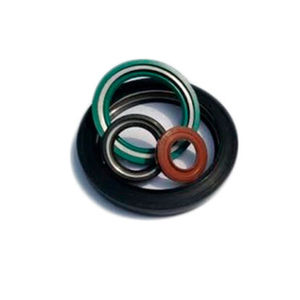
- Materials - Tools - Components
- Standard Mechanical Component
- Lipped seal
- Duff-Norton Europe

- Company
- Products
- Catalogs
- News & Trends
- Exhibitions
Rotating shaft seal OOAlippedVstainless steel

Add to favorites
Compare this product
Characteristics
- Type
- lipped
- Configuration
- V
- Material
- stainless steel, elastomer
- Application
- for gearbox, for pump, stud, gear, for hydraulic applications, for hydraulic fluids, industrial, for shafts, axis, motor, for rotating shafts, housing, fitting, for chemical applications, for screw compressors, gearbox, for high-temperature applications, for chemicals
- Fluid
- water
- Other characteristics
- hydraulic, dynamic, pneumatic, single-acting, radial, high-temperature
- Temperature limit
Min.: -50 °C
(-58 °F)Max.: 300 °C
(572 °F)- Pressure limit
Min.: 0 bar
(0 psi)Max.: 15 bar
(217.6 psi)- Diameter
Min.: 4 mm
(0.157 in)Max.: 380 mm
(14.961 in)- Outer diameter
Min.: 10 mm
(0.394 in)Max.: 420 mm
(16.535 in)- Speed
Min.: 0 m/s
(0 ft/s)Max.: 40 m/s
(131.2 ft/s)
Description
VR radial sealing rings seal rotating shafts, spindles, journals and all rotating axes.
The main advantage of the VR radial shaft sealing ring is the low torque on the rotating element to be sealed.
The torque is reduced by 50% to 60% compared to conventional lip seals.
This benefit allows:
The use of standard or stainless steel shafts
Removal of surface treatments: carburizing, hard chrome plating, etc…
The direction of rotation is irrelevant
High non concentricity (up to 0.4mm)
Roughness Ra 0,4 ED
This allows:
A very low friction on the shaft
Very low heat build-up
Use with many fluids (8 different standard elastomers)
Reduced space requirement
How it works:
The operation of the VR joints is based on 2 fundamental characteristics:
A radial force between the seal lip and the shaft
Additional pre-tension of the lips on the axis
Catalogs
No catalogs are available for this product.
See all of Duff-Norton Europe‘s catalogsOther Duff-Norton Europe products
Low pressure Rotary Seals - Single Lipseals
*Prices are pre-tax. They exclude delivery charges and customs duties and do not include additional charges for installation or activation options. Prices are indicative only and may vary by country, with changes to the cost of raw materials and exchange rates.





